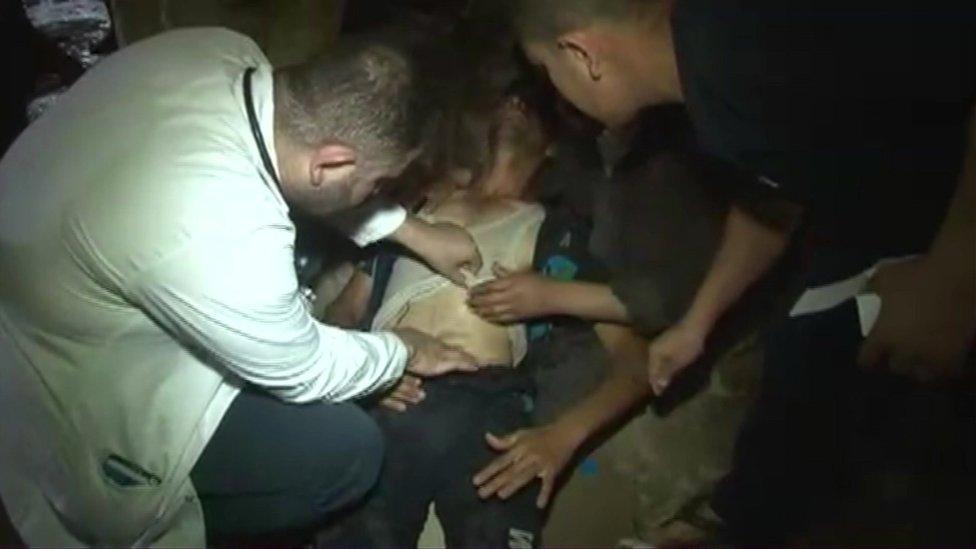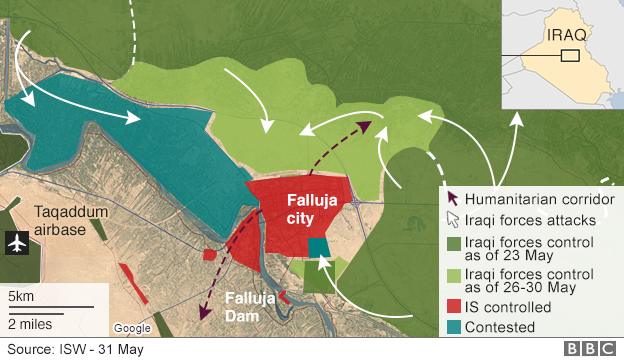IS conflict: Falluja detainees 'tortured by Shia militias'
- Published

Video purportedly of the released detainees showed a number of men receiving treatment
The Iraqi government has been urged to investigate allegations that civilians detained during the battle for Falluja have been tortured by Shia militiamen.
An Anbar provincial council member told the BBC that hundreds were held as government forces fought Islamic State militants in the suburb of Saqlawiya.
Those released showed signs of severe torture, Sheikh Raja al-Issawi said.
Four people died as a result of their injuries and others were in a critical condition in hospital, he added.
Shia militias have been accused of committing serious abuses against Sunni civilians while helping the Iraqi government regain territory it lost to so-called Islamic State (IS) in 2014.
The militias have denied the accusations, but the government has said they will be held back from the final assault on Falluja, a predominantly Sunni city, amid fears of sectarian reprisals.
Falluja: Embattled city of mosques
Final push for Falluja some way off
Security forces and members of the Popular Mobilisation, a paramilitary force that is dominated by Shia militias, advanced into Saqlawiya over the weekend.
The town, about 7km (four miles) north-west of Falluja, was an IS stronghold and military sources said resistance was fierce.
Sheikh Issawi said that 605 people detained during the fighting had been taken to the al-Mazraa army base, east of Falluja, on Sunday night.
The BBC's Elaine Jung reports: "In celebration they wave the flag of the so-called Islamic State group upside-down"
Those subsequently freed said they had been tortured by members of the Popular Mobilisation during interrogation to ensure they were not IS militants, he added.
Video footage purportedly of the released detainees showed a number of men receiving treatment from medics for injuries to their heads and upper bodies.
"They've intended to kill us. They accused us of being Daesh. I have nothing to do with Daesh," one of the men in the video said, using an Arabic acronym based on the previous name of IS.
Another man said: "I swear to God they beat me with a shovel and a baton on my head. They threatened to kill anyone who asked for water."
Sheikh Issawi and other members of the provincial council called on Prime Minister Haider al-Abadi to open an urgent investigation into the alleged abuses.

On Sunday, a spokesman for Mr Abadi said a human rights committee would examine "any violation to the instructions on the protection of civilians".
Saad al-Hadithi noted that the prime minister had issued "strict orders" that those responsible for any abuses be held accountable.
The Sunni speaker of parliament, Salim al-Jubouri, has also expressed concern at reports of "violations" by members of the police and Popular Mobilisation, without providing any details.
The mayor of Saqlawiya also confirmed on Monday that security forces had discovered a mass grave containing the remains of about 400 people summarily killed by IS militants when they took control of the town in January 2014.
Jassim al-Mohammedi said most of the victims were believed to be pro-government Sunni tribal fighters, and security personnel and civilians from Saqlawiya.
The Norwegian Refugee Council meanwhile reported that IS militants had been shooting at civilians as they tried to flee Falluja by crossing the River Euphrates.